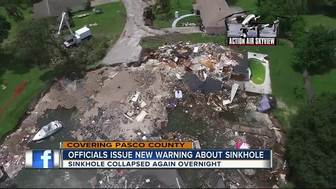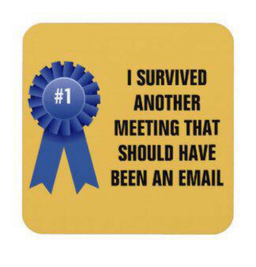 I have yet to ever meet anyone who enjoys meetings. Well, anyone sane who enjoys meetings. Unfortunately, we've created a culture where meetings have become a necessary evil, and at the core of a lot of our disdain for meetings is that we've been to far too many meetings that were absolute time sinkholes. A time sinkhole is where time disappears because it was wasted. Wasted time in meetings causes people to be frustrated, knocks out any momentum that could be generated, and fosters a general apathy towards meetings. Meetings can be times of generating ideas, creating action plans, and making sure leadership is all on the same page. But too often we create time sinkholes, here are 7 ways to avoid them in meetings. 1. Have an agenda - Meetings without a plan quickly disintegrate into gripe sessions or aimless wandering through rabbit holes. Agendas have a clear plan of action, specific talking points, and keep everything flowing for the meeting. Agendas keep meetings from chasing tangents because they clearly lay out the objectives, so that everyone stays on task. 2. Start (and end) on time - Meetings shouldn't just have a start time, they should have an end time. And unless there's lengthy strategy or brainstorming, meetings shouldn't take longer than 30-45 minutes if you're sticking to the agenda. The people who attend your meetings are giving up their time to attend, and they have lots of other things they're busy working on. Respect their time and steward it well. If the meeting begins at 2 and is slated to be over by 2:45, end at 2:45. If you don't cover everything, do a follow-up correspondence.  3. Don't talk about things that could be an email - All of us have sat in meetings where endless discussion happened on things that could have been quickly covered in an email. The only things that need to be talked about in a meeting are the things that require a meeting. Anything else, send it in an email before or after. That's the argument from Read This Before Our Next Meeting, where meetings have a specific purpose and function - to generate action. 4. Have an action plan - If at the end of the meeting you've got nothing you're doing as a result of the meeting, congrats... you wasted everyone's time. No meeting should ever end without clear action plans that flow from the discussion. An action plan includes a point person, a specific task, and a timeframe for completion. 5. Facilitate discussion well - If you're leading a meeting, you're setting the pace. Discussion is important, but as the leader you have the responsibility to steward and shepherd the discussion well. Make sure it stays on point, contributes to the discussion, and then when the dead horse has been beaten enough, you bring it to an end. 6. Expect punctuality - All of us have things that keep us from being on time. A few weeks ago I got snagged in another appointment and left a guy hanging for 30 minutes while I was trying to get away. But these should be the exception rather than the rule for us. If we're going to do meetings well, we should expect punctuality. Extenuating factors can certainly be considered, but someone just "not being able to make it on time" is unacceptable. 7. Keep the main thing the main thing - A meeting should have a single purpose, keep the focus on that. Always keep coming back to the main thing. If you're in a planning/strategy meeting for VBS, this isn't the time to discuss the Wednesday Potluck. If you're planning the worship service for Sunday, don't tack on discussion about facility usage. Drawing everything back to the purpose for the meeting ensures that you not only have the time needed to discuss, but also the attention of everyone there to make sure it's a fruitful meeting. What have you done as a leader to avoid Time Sinkholes?
0 Comments
Leave a Reply. |
Scott M. DouglasA blog about leadership and the lasting legacy of family ministry. Archives
August 2023
Categories
All
|
 RSS Feed
RSS Feed



